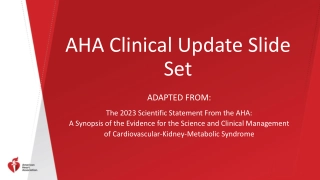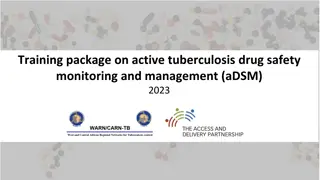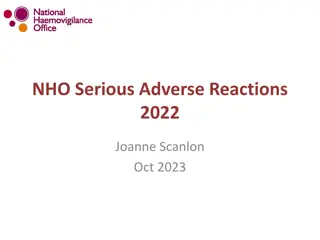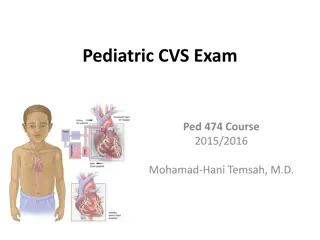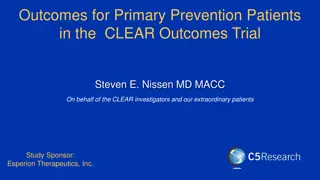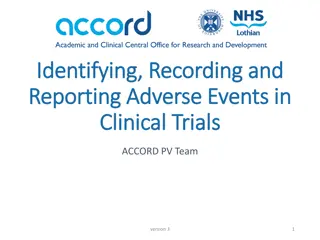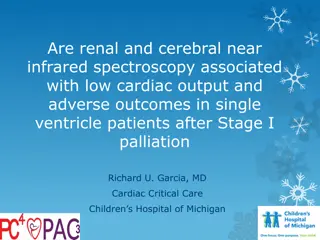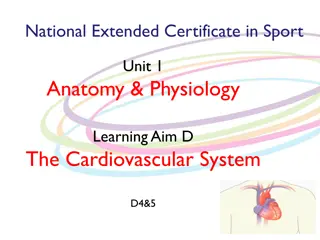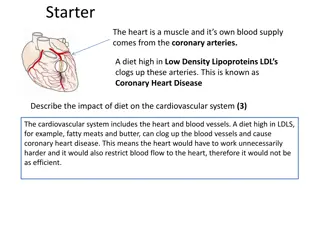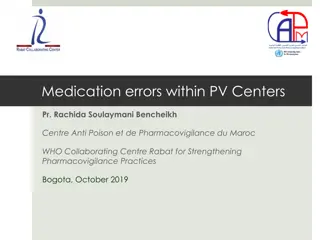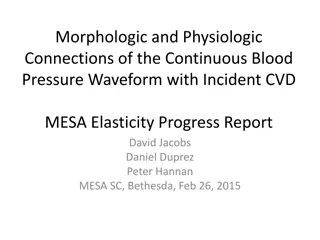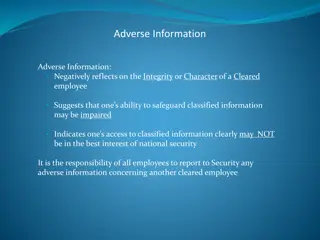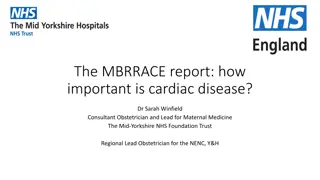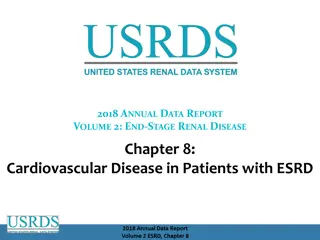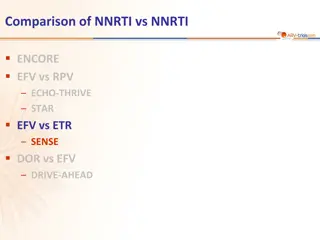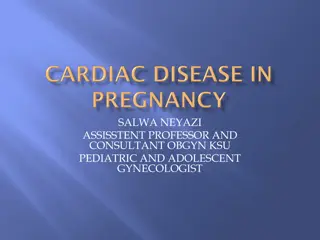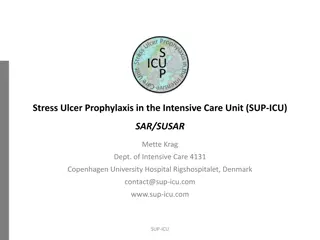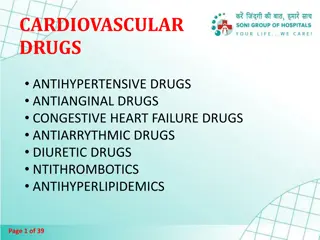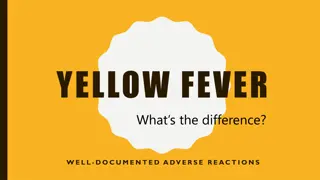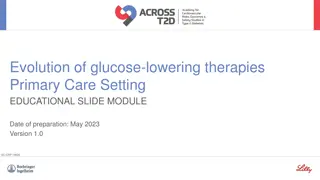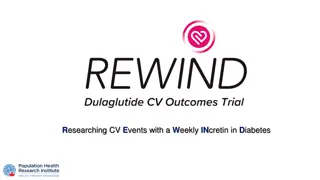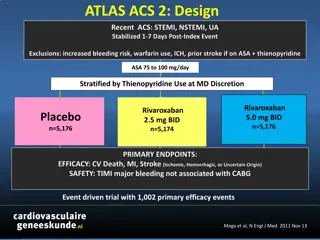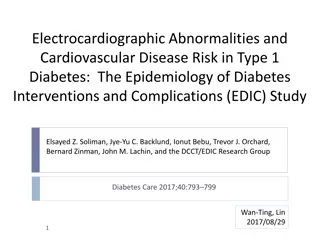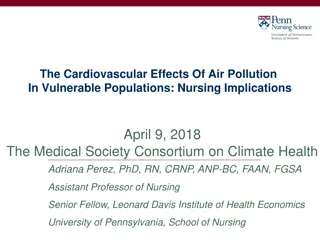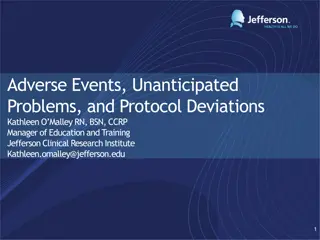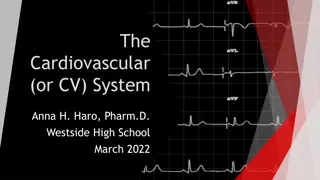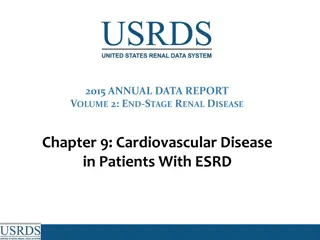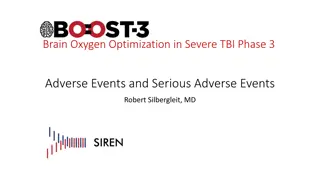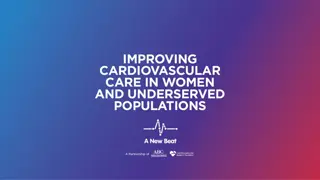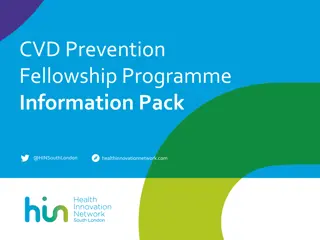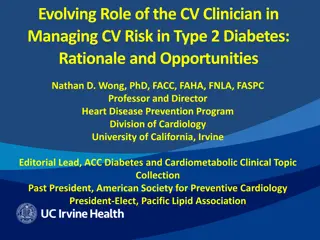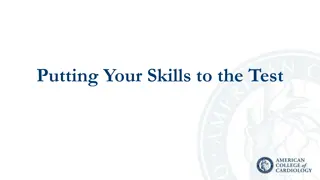AHA Clinical Update Slide Set
The evidence-based science and clinical management of Cardiovascular-Kidney-Metabolic Syndrome (CKM) in this comprehensive slide set. Learn about the pathophysiological interactions, multi-organ dysfunction, and adverse cardiovascular outcomes associated with CKM.
0 views • 14 slides
Inflammation and Cholesterol Predicting Cardiovascular Events
This study explores how inflammation and cholesterol levels predict cardiovascular events among 13,970 statin-intolerant patients in the CLEAR Outcomes trial. Findings suggest residual inflammatory risk may be a stronger predictor than residual cholesterol risk for future events. The research analyz
0 views • 17 slides
Ticagrelor Monotherapy vs. 12-Month Dual Anti-Platelet Therapy After Coronary Stent Implantation for ACS
The study compares the efficacy of ticagrelor monotherapy after less than 1 month of dual anti-platelet therapy (DAPT) to 12-month ticagrelor-based DAPT in patients with acute coronary syndrome (ACS) undergoing percutaneous coronary intervention (PCI) with drug-eluting stent implantation. The aim is
1 views • 19 slides
Insights from the REPRIEVE Trial for Managing Cardiovascular Risk in Patients with HIV
Cardiovascular disease is a growing concern in individuals living with HIV, despite advancements in treatment. The REPRIEVE Trial sheds light on the importance of assessing cardiovascular risk and implementing primary prevention measures in this population. Dr. Grinspoon's financial disclosures and
0 views • 35 slides
The REPRIEVE Trial: Developing Cardiovascular Disease Prevention Strategy for People Living with HIV
The REPRIEVE trial focuses on developing a cardiovascular disease prevention strategy for individuals living with HIV. It addresses the increased risk of CVD in this population, even with good viral suppression. The study evaluates the use of pitavastatin, a statin with anti-inflammatory properties,
1 views • 33 slides
Active Tuberculosis Drug Safety Monitoring and Management Training Package 2023
This training package focuses on the safety monitoring and management of active tuberculosis drugs, specifically emphasizing causality assessment in determining adverse reactions. Participants will learn about assessing the likelihood of TB medicines causing adverse events, attributing relationships
3 views • 17 slides
Overview of Serious Adverse Reactions and Transfusion Events
This data compilation covers the reporting trends, breakdown of reports, components issued, and specific types of adverse transfusion reactions experienced within the National Healthcare Organization (NHO) from 2019 to 2022. The information includes statistics on Serious Adverse Events (SAE), Seriou
2 views • 46 slides
Pediatric Cardiovascular Exam Overview
Explore the differences between pediatric and adult cardiovascular exams, highlighting key differences in disease patterns, examination approaches, and objectives. Learn about the importance of distinguishing between routine well-baby exams and evaluations of ill children, along with step-by-step gu
6 views • 24 slides
Understanding Adverse Events Following Immunization (AEFI)
Adverse Events Following Immunization (AEFI) are medical incidents that occur after immunization, potentially caused by the vaccine, leading to unfavorable symptoms. Pharmacovigilance plays a crucial role in detecting, assessing, and preventing these events. AEFI can impact immunization programs at
2 views • 40 slides
CLEAR Outcomes Trial: Bempedoic Acid for Cardiovascular Prevention
The CLEAR Outcomes Trial investigated the effects of bempedoic acid, an ATP citrate lyase inhibitor, on cardiovascular outcomes in primary prevention patients. Results showed a reduction in cardiovascular events with bempedoic acid, particularly in patients intolerant to statins. Baseline characteri
1 views • 13 slides
Understanding Adverse Events in Clinical Trials
This presentation covers the identification, recording, and reporting of adverse events in clinical trials conducted by University of Edinburgh and/or NHS Lothian. It includes definitions, examples of adverse event recording, SAE form completion, and common mistakes. AEs can range from minor issues
0 views • 35 slides
Association of Renal and Cerebral Near-Infrared Spectroscopy with Adverse Outcomes in Single Ventricle Patients after Stage I Palliation
Study investigates the association between renal and cerebral near-infrared spectroscopy (NIRS) values and low cardiac output syndrome in single ventricle patients post Stage I palliation. Data from infants who underwent surgery between 2010-2019 is analyzed to determine correlations with adverse ou
0 views • 13 slides
Effects of Exercise on the Cardiovascular System
Exploring the immediate and long-term effects of exercise on the cardiovascular system reveals the remarkable adaptations and responses the body undergoes. From short-term increases in heart rate and blood pressure to long-lasting changes in cardiac output, exercise plays a crucial role in enhancing
0 views • 13 slides
Impact of Diet on Cardiovascular Health
The impact of diet on the cardiovascular system is significant, with a high intake of LDL leading to clogged arteries and increased risk of Coronary Heart Disease. Regular exercise brings about positive changes in the cardiovascular system, enhancing heart function and oxygen delivery. Immediate ben
0 views • 7 slides
Understanding Medication Errors in Pharmacovigilance Centers
Adverse drug reactions resulting from medication errors are a significant concern faced by pharmacovigilance centers. This content discusses the importance of this problem, contributing factors, the relevance to pharmacovigilance centers, and strategies for managing medication errors. It highlights
4 views • 29 slides
Morphologic and Physiologic Connections in Blood Pressure Waveforms for Cardiovascular Event Prediction
This report discusses the morphologic and physiologic connections in continuous blood pressure waveforms and their association with incident cardiovascular events. The study aims to assess if changes in arterial elasticity contribute to predicting CVD events and explores additional measures derived
0 views • 30 slides
Understanding Adverse Information Reporting in National Security
This detailed content covers the importance of reporting adverse information regarding cleared employees in national security settings. It outlines the impact of adverse information on security clearances, the 13 adjudicative guidelines used in determining eligibility for sensitive duties, NISPOM re
0 views • 15 slides
The Importance of Addressing Cardiovascular Disease in Maternal Health
Cardiovascular disease remains a significant contributor to maternal mortality in the UK, with maternal deaths from cardiac issues outnumbering those from other direct causes, except thrombosis. The prevalence of cardiovascular risk factors in pregnant women, combined with a lack of consideration fo
0 views • 22 slides
Prevalence of Cardiovascular Disease in Adult ESRD Patients: 2016 Data Report
The data report examines the prevalence of cardiovascular diseases in adult End-Stage Renal Disease (ESRD) patients in 2016 by treatment modality and age. It includes information on various cardiovascular conditions such as atrial fibrillation, acute myocardial infarction, coronary artery disease, a
2 views • 25 slides
Comparison of NNRTI vs. NNRTI in SENSE Study
The comparison between Etravirine (ETR) and Efavirenz (EFV) in the SENSE Study showed differences in neuropsychiatric adverse events, treatment response, and patient characteristics. ETR with 2 NRTIs resulted in fewer drug-related adverse events than EFV with 2 NRTIs. ETR also showed better response
0 views • 7 slides
Understanding Cardiovascular Changes in Pregnancy
This informative content discusses the normal physiological changes of the cardiovascular system in pregnancy, symptoms and signs of cardiovascular disease, the impact of pregnancy on cardiovascular health, and the management of cardiovascular issues during pregnancy, labor, and the postpartum perio
0 views • 28 slides
Stress Ulcer Prophylaxis in ICU - Adverse Reactions Reporting Guidelines
Guidelines for reporting adverse reactions in Stress Ulcer Prophylaxis in the Intensive Care Unit (SUP-ICU), including definitions of Adverse Reactions (AR), Serious Adverse Reactions (SAR), Adverse Events (AE), Serious Adverse Events (SAE), SARs in SUP-ICU, and SUSARs. Specific conditions considere
0 views • 8 slides
Understanding Cardiovascular Drugs: An Overview of Treatment Options
Explore the world of cardiovascular drugs, including antihypertensive, antianginal, heart failure, antiarrhythmic, diuretic, antithrombotic, and antihyperlipidemic medications. Dive into the mechanisms of action, clinical indications, and adverse effects of these drugs, gaining valuable insights int
0 views • 39 slides
Yellow Fever: Adverse Reactions and Risks
Yellow fever vaccination can lead to severe adverse reactions like anaphylaxis, neurotropic disease, and viscerotropic disease. These reactions can range from immediate hypersensitivity to rare but serious outcomes such as meningitis and multiple system organ failure. The mortality rate associated w
0 views • 11 slides
Association of Fruit, Vegetable, and Legume Intake with Cardiovascular Disease and Mortality
The study conducted by the PURE investigators examined the relationship between fruit, vegetable, and legume consumption and cardiovascular disease (CVD) and mortality in a cohort of 135,335 individuals from 18 countries. Dietary guidelines recommend at least 5 daily servings of these foods, which h
0 views • 27 slides
Evolution of Glucose-Lowering Therapies in Primary Care Settings
Cardiovascular effects of older glucose-lowering therapies and the history of cardiovascular outcome trials are discussed in this educational slide module. It outlines the timeline of treatment options from the discovery of insulin to the introduction of various medications. Evidence regarding the c
0 views • 29 slides
Investigating the Impact of Weekly Incretin on Cardiovascular Events in Diabetes
Individuals with type 2 diabetes have an increased risk of cardiovascular events compared to those without the condition. Research indicates that certain GLP-1 receptor agonists have shown promising results in reducing cardiovascular events in diabetic patients with specific HbA1c levels. However, t
0 views • 69 slides
Clinical Trial Results of Rivaroxaban in ACS Patients: ATLAS-ACS 2 Study
The ATLAS-ACS 2 study investigated the efficacy and safety of rivaroxaban in ACS patients post-index event. The primary endpoints included cardiovascular death, MI, and stroke, with significant reductions seen with rivaroxaban compared to placebo. Stent thrombosis was also reduced with rivaroxaban t
0 views • 10 slides
Electrocardiographic Abnormalities and Cardiovascular Disease Risk in Type 1 Diabetes
This study examines the association between ECG abnormalities and incident CVD events in patients with type 1 diabetes, focusing on the prognostic significance in a population where CVD develops earlier. Major and minor ECG abnormalities were classified, with cardiovascular events such as myocardial
0 views • 16 slides
GripTrack: Innovative Device for Monitoring Elderly Health
GripTrack is a portable grip strength monitoring device designed to track cardiovascular and musculoskeletal health in the elderly population. It aims to provide an accurate early warning system by assessing grip strength, which can indicate cognitive decline, cardiovascular health, and frailty synd
0 views • 14 slides
Understanding the Cardiovascular Effects of Air Pollution in Vulnerable Populations
This presentation discusses the significant cardiovascular effects of air pollution, particularly on vulnerable populations such as older adults, women, and Latinos. It highlights the environmental factors contributing to cardiovascular health disparities and emphasizes the nursing implications for
0 views • 13 slides
Understanding Skin Sensitisation through Adverse Outcome Pathways (AOP)
The Adverse Outcome Pathway (AOP) for Skin Sensitisation provides a mechanistic framework linking Molecular Initiating Events (MIE) to Adverse Outcomes (AO) through Key Events (KE) and Key Event Relationships (KER). AOPs offer a transparent justification for toxicological predictions and play a vita
0 views • 21 slides
Understanding Adverse Events and Unanticipated Problems in Clinical Research
Explore the significance of adverse event reporting in clinical research, including definitions of adverse events (AEs) and serious adverse events (SAEs), as well as unanticipated problems (UAPs). Learn about the responsibilities of Investigators, Clinical Research Coordinators (CRCs), and Sponsors
0 views • 63 slides
Understanding the Cardiovascular System: Anatomy, Physiology, and Function
Explore the intricate workings of the cardiovascular system, encompassing the heart, blood vessels, and blood circulation. Learn the anatomy, physiology, and function of this vital system, including the roles of arteries, veins, capillaries, and red and blue blood. Understand how the cardiovascular
0 views • 23 slides
Cardiovascular Disease in End-Stage Renal Disease Patients: Data Analysis 2011-2013
Understanding the prevalence and causes of cardiovascular diseases in patients with End-Stage Renal Disease (ESRD) is crucial for effective management. This report analyzes data from 2011-2013, focusing on the causes of death in ESRD patients, prevalence of cardiovascular diseases by treatment modal
0 views • 18 slides
Brain Oxygen Optimization in Severe TBI: Adverse Events Analysis
This study led by Dr. Robert Silbergleit focuses on adverse events in brain oxygen optimization for severe Traumatic Brain Injury (TBI) patients. It outlines key points for reporting adverse events, discusses relatedness algorithms, and presents scenarios to analyze adverse events occurrence post-en
0 views • 24 slides
Insights on Cardiometabolic Risk Reduction and Diabetes Treatment in 2019
Cardiologists in 2019 must address the significant cardiovascular risks associated with diabetes mellitus. Dr. Keith C. Ferdinand highlights the increased rates of heart disease, stroke, and heart failure in patients with diabetes. Despite advancements, cardiovascular risk management remains subopti
0 views • 10 slides
Cardiovascular Disease Prevention Fellowship Programme Information Pack
The Cardiovascular Disease Prevention Fellowship Programme by Health Innovation Network offers a comprehensive 7-month program for healthcare professionals to enhance their skills in cardiovascular disease prevention. The program includes clinical webinars, improvement collaborative sessions, and qu
0 views • 14 slides
The Evolving Role of Cardiovascular Clinicians in Managing Type 2 Diabetes Risk
The role of cardiovascular clinicians in managing cardiovascular risk in patients with type 2 diabetes is evolving, with a growing emphasis on collaboration with multidisciplinary teams. Recognizing the potential benefits of certain diabetes medications on cardiovascular outcomes, clinicians are urg
0 views • 25 slides
Understanding PCSK9 Inhibitors for Cardiovascular Health
PCSK9 inhibitors are a novel class of medications that help lower LDL cholesterol levels, reducing the risk of cardiovascular events. This article covers their mechanism of action, patient groups benefiting from them, efficacy in LDL-C lowering, and safety considerations. Learn how PCSK9 inhibitors
0 views • 8 slides
